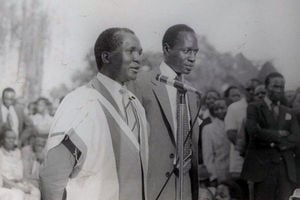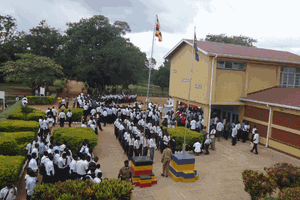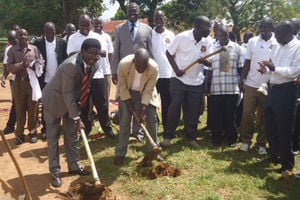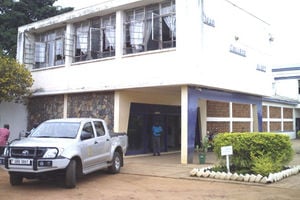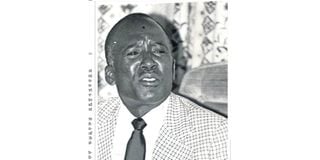
Mr Stephen Besweri Akabway, the former head of the Interim Electoral Commission. PHOTO/ FILE
Twenty nine years ago last month, President Museveni nominated the commissioner of the Constituent Assembly (CA), Mr Stephen Besweri Akabway, to head the Interim Electoral Commission (IEC) to manage the 1996 presidential and parliamentary elections, the first under the 1995 Constitution.DM bodytext: Mr Akabway had at the time been hailed by both sides of the political divide and the international community for his handling of the March 1994 CA elections, which were deemed to have been generally free and fair.
Quoting a letter from the Cabinet secretary, The Monitor edition of October 27, 1995, reported that the minister of State for Constitutional Affairs, Mr Steven Kavuma, informed Cabinet on October 24, 1995, that the President had named Mr Akabway to head the IEC with Mr John Ntimba as his deputy.
At the time, Mr Ntimba, who had served as deputy minister in-charge of Higher Education in the first NRM Cabinet, was the member representing Mbarara Municipality in the National Resistance Council (NRC). He had, however, suffered defeat at the hands of Ms Winnie Byanyima during the CA elections of March 1994.
Ntimba, who left Cabinet in 1991, lost the battle to cancer in July 2014.
The other three nominees to the five-man IEC were Mr Charles Owor, who had represented Aswa County, Gulu, in the CA; Mr Margaret Sekajja, a lecturer at the Law Development Centre, and Kampala businessman Phillip Idro.
During the presidential campaigns the following year, Owor stirred the waters when he called candidate Museveni’s campaign team to order for using skulls from the war in Luweero to campaign against Mr Museveni’s main challenger, Paul Kawanga Ssemogerere, the president general of the Democratic Party (DP).
"Don't forget the past. Over one million Ugandans, our brothers, sisters, family and friends, lost their lives. YOUR VOTE COULD BRING IT BACK," one of the adverts read.
Whereas the IEC had remained conspicuously silent about the controversy surrounding the adverts, Mr Owor castigated Mr Museveni’s campaign team. The campaign team was led by John Nagenda. Nagenda was to later become Mr Museveni’s advisor on media and public relations.
Mr Museveni was declared the winner of the 1996 presidential elections with 4,428,119 votes (74.2 per cent) against Ssemogerere’s 1,416,139 votes (23.8). The other candidate in the race was Mr Mohammed Kibirige Mayanja who got 120,000 votes.
Commissioner Owor, however, poured cold water on Mr Museveni’s victory when declared on October 16, 1998, during a conference organised in Kampala by the political pressure group “Free Movement” that “under age voting” had been carried out to favour the NRM.
Again on October 23, 1998, while appearing on Radio One FM’s talk show Spectrum, Owor insisted that there had been “fundamental flaws in election”.
Ms Ssekagya, who went on to become the first chairperson of the Uganda Human Rights Commission, had also served as a research officer in the CA Secretariat.
New law
Then at the end of October, it emerged that the government was set to table before the NRC, the Interim Presidential Elections Bill, 1995, and the Interim Parliamentary Elections Bill, 1995.
It emerged that the draft Interim Presidential Elections Bill, 1995, provided that the State gives Shs10 million to presidential candidates.
Section 8 of the Bill directed the Secretary to the Treasury to within two weeks after the nomination day, “pay to every candidate a sum of Shs10 million which the candidate shall devote solely for the purposes of conducting his or her campaign”.
The recipients of the Shs10 million were, however, required to account for it within 30 days after polling day.
The law under sub-section (2), however, noted that the said presidential candidates were at liberty to raise additional funds for their campaigns.
The proposed legislation came at a time when donors, the international community and the political Opposition were pressing the NRM government to level the political playing field ahead of the presidential and parliamentary elections.
Ssemogerere had already told a press conference in Kampala a week before the proposed laws emerged that he and his party would be open to the idea of boycotting the elections if the ground was not level.
“I want these elections to take place, but if the law does not answer [our demands], we shall do the obvious,” Ssemogerere said.
In what was widely read to be a cure to some of the demands that the Opposition was making at the time, Section 9 of the Interim Presidential Elections Law proposed that “except as authorised under this Act, no candidate shall use government resources for the purpose of campaigning for election”.
Sub-section (2), however, proposed that “notwithstanding sub-section (1), a candidate who for the time being is holding the office of President, may continue to use during the campaign and shall use only those government facilities which are ordinarily attached and utilised by the holder of that office”.
The section also proposed that it shall be a valid ground for a petition if a candidate utilised government resources not authorised under the law.
Section 7 proposed that “every presidential candidate shall be at liberty to hold individual campaign rallies in any part of Uganda in accordance with any existing law”.
Sub-section (2), however, proposed that the Electoral Commission shall prepare and conduct a programme called the presidential candidates meetings programme. All presidential candidates shall speak at one such meeting in every district.
Sub-section (4) proposed that “no candidate in an election shall be denied reasonable access, and use of State-owned media communication” while sub-section (5) says “all candidates shall be given free and reasonable time and space in the State-owned media to present their programmes to the people.”
Qualifications
The law also spelt out the requirements for one to be eligible to be a presidential candidate.
To qualify to be a presidential candidate, Section 5 (2) said candidates had to submit to the Electoral Commission a day before nomination day nomination papers which had to be supported by 100 voters in each of at least two-thirds (26) of all the districts in Uganda.
In other words, each candidate was required to have at least 2,600 signatures of registered voters.
Sub-section (3) proposed that the nomination paper had to be accompanied by, among others, a form for declaration of assets and liabilities; and a deposit of Shs2 million.
Candidates who would poll more than 25 percent of the total votes cast in the election would be entitled to a refund of Shs2 million.
Penalties
Reports in the local press indicated that the idea of having the candidates declare their assets and liabilities was the brainchild of President Museveni, who also insisted that it had to be accompanied by penalties.
The proposed law provided that a person who knowingly made a false declaration of assets and liabilities committed an offence and would be liable on conviction to a term of imprisonment not exceeding two years without an option of a fine.
Age limits
Other provisions of the law were that a presidential candidate had to be a citizen of Uganda by birth, and had to be at least 35 years of age, but not more than 75 years of age.
It should be remembered that the lower and upper age limits were scrapped when Parliament voted on December 20, 2017, to amend Article 102(b) of the 1995 Constitution.
The law also proposed that a presidential candidate had to have completed a minimum formal education of Advanced-Level standard or its equivalent.
The elections, the law stated, would be by universal adult suffrage and through a secret ballot.
Threshold
The Bill stated that a candidate needed to have garnered at least 50 percent of the valid votes cast in order to be declared President of Uganda.
Where there would be more than two candidates, and none of the candidates would have obtained the required 50 percent, another election would be held within 30 days after the declared result, but only the two leading candidates could contest that repeat election.
